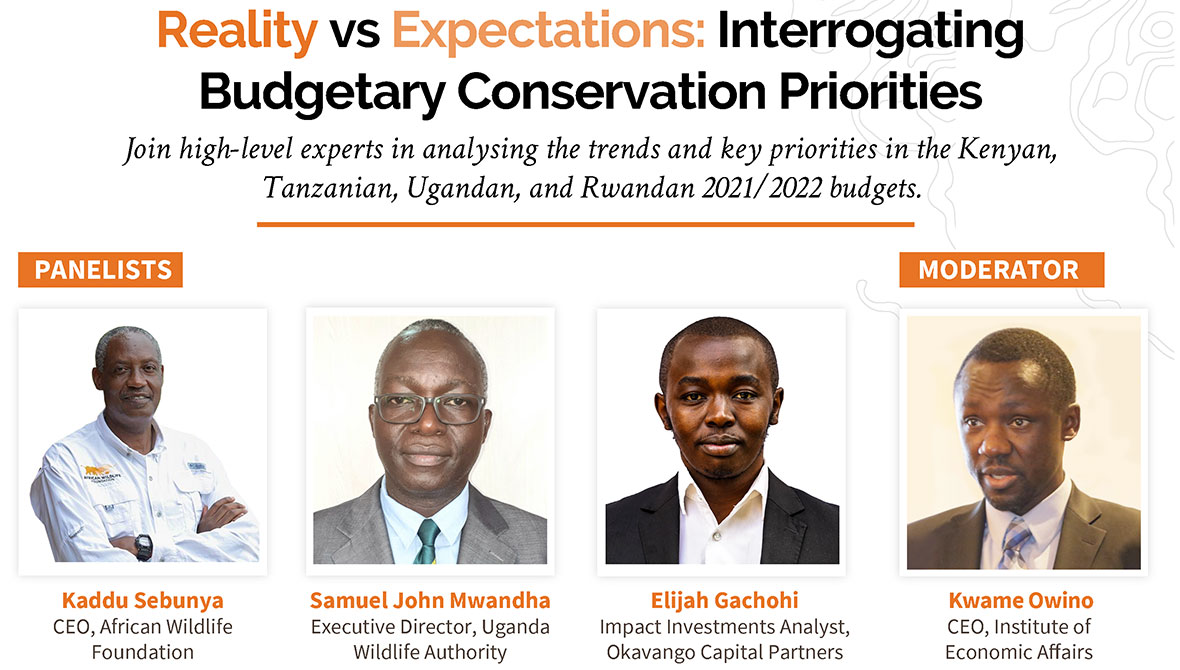AWF Leads Discussion on Funding Conservation

General Inquiries
Tel:+254 711 063 000
Ngong Road, Karen, P.O. Box 310
00502 Nairobi, Kenya
NAIROBI, KENYA (June 16, 2021) — African Wildlife Foundation (AWF) hosted a webinar to discuss the budget resource allocation for four countries in the East African Region. The webinar, which also included an analytical presentation by the Institute of Economic Affairs, revealed the woeful underfunding towards conservation across Kenya, Uganda, Rwanda, and Tanzania.
Under the title ‘Reality vs Expectations: Interrogating Budgetary Conservation Priorities’ and moderated by the Institute of Economic Affairs (IEA) CEO Kwame Owino, the webinar brought together a panel of experts consisting of AWF CEO Kaddu Sebunya, Samuel John Mwandha, Executive Director of Uganda Wildlife Authority, and Elijah Gachochi, Impact Investments Analyst of Okavango Capital Partners.
A review of the macroeconomic information and data for the four largest countries of the EAC shows that all of them had robust economic growth since 2016. The average growth rates for each of them were above the sub-Saharan Africa average, meaning that each was experiencing favorable conditions allowing for the dedication of budget resources to maintain that growth.
The only challenge on their growth horizons was the rise in debt and repayment obligations for all these countries, save for Tanzania. It is against this background that the EAC countries had to confront the challenge of the COVID-19 pandemic. In continuation of the tradition, the three largest countries presented the budget statements for the next financial year on June 10, 2021.
Speaking during the webinar, AWF CEO Kaddu Sebunya urged that while economic development and conservation might seem like contrasting issues, they are in fact interlinked. That is why we need to call on our governments to work toward economic development alongside protecting and restoring ecosystems. We are still fixated on chasing a western model instead of developing a suitable African model. To achieve this African model - we are going to need some surprising alliances that bring different sectors together – and budgets today need to reflect this trajectory.
Despite the significance of conservation to the region, an assessment of the overall allocations to ministries, departments, and agencies that bear direct responsibility for conservation betrays the fact that the sector is not a priority for governments. While EAC budgets are detailed in many respects, the classification of the conservation budget lines is not uniform posing a challenge for comparison. Regardless of the challenges in comparison of the budgets, it is clear that conservation budgets are inadequate throughout East Africa.
Executive Director of Uganda Wildlife Authority Samuel John Mwandha reiterated the need for conservation partners to adopt innovative and alternative sources of income by stating that, “the COVID-19 pandemic whilst posing many challenges has also exhibited a wide range of opportunities that we must take advantage of to supplement income revenue streams." As a sector, we must reduce our overreliance on government funding and source for sustainable and inclusive partnership models – for the sake of both the communities and wildlife dependent on tourism and conservation.
The webinar is a precursor to an inaugural budget analysis report that will detail the trends and priorities of budget allocations within the region. The report is set to be released by the end of June.
About African Wildlife Foundation
The African Wildlife Foundation is the primary advocate for the protection of wildlife and wildlands as an essential part of a modern and prosperous Africa. Founded in 1961 to focus on Africa’s conservation needs, we articulate a uniquely African vision, bridge science, and public policy, and demonstrate the benefits of conservation to ensure the survival of the continent’s wildlife and wild lands.
MEDIA CONTACT: For more information about the AWF’s budget analysis report. Contact Wambui Odhiambo at [email protected].